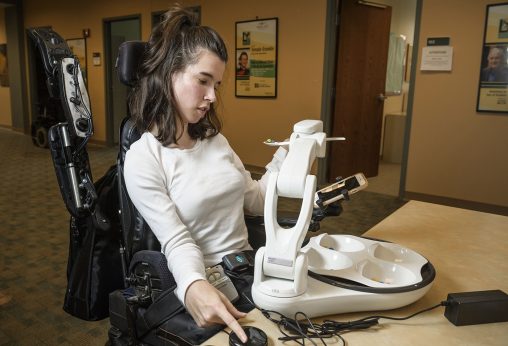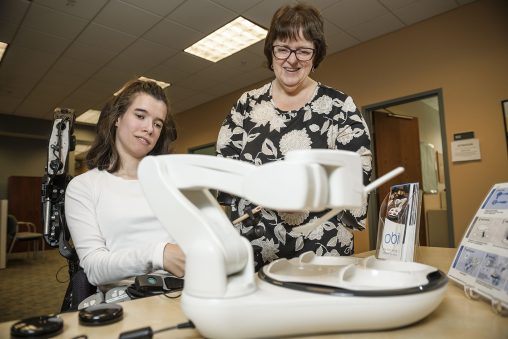Three robotic dining devices for students with disabilities who need assistance feeding themselves now have a home at Wright State, which is believed to be the only university with such technology.
Thanks to a $15,000 grant from the Christopher and Dana Reeve Foundation’s Quality of Life Program, the Obi robots are available for use at the Marketplace and The Hangar cafeterias. There is also one used for training in the Office of Disability Services (ODS).
Among the 1,000 students registered with ODS, many students with disabilities eat at the cafeterias daily. Some 15 to 20 students with multiple disabilities receive personal assistance from a pool of caregivers who assist and help feed them.
“We’re very progressive when it comes to students with physical disabilities, said Katherine Myers, assistive technology specialist for ODS. “We really look at what their needs are and how we help them to be more independent.”
Obi, invented by Jon Dekar, president and co-founder of Dayton startup DESiN, LLC, enables diners to have a more empowering and independent experience by giving them remote control over selecting food items with a spoon and guiding it to their mouths.
“There is a social aspect to eating and this way students can be totally social and not have to just depend on someone else to feed them their whole meal,” said Myers.

Sarah Faith Davis, a freshman communication major, demonstrates Obi, a robotic dining device now available to students with disabilities in the Marketplace and The Hangar. (Video by Kris Sproles / Photos by Erin Pence)
Switches are used to control the sleek white Obi, which spoons up the food and delivers it to the mouth of the user with a ballet-like grace. The device is calibrated to account for each user’s stature, location and position. It can be programmed for 6,000 different feeding positions within one millimeter of accuracy.
Sarah Faith Davis, a freshman communication major from Atlanta, recently started using one of the Wright State robots.
“When I used it for the first time, it made me feel like I could be really independent with feeding myself,” said Davis. “It was like, ‘Hey, I might be able to use this to go eat with my friends and not have to rely on other people to help feed me.’”
Davis said Obi gives her more control over selecting which foods on her plate she wants to eat next.
“And it’s really easy to control it so I don’t have to worry about bringing the spoon to my mouth,” she said. “…Obi just makes me not have to worry about feeding myself and feel a lot more comfortable with feeding.”
Users control Obi by pressing buttons, but a switch is available for people who cannot use their hands.
“We are so excited about this program at Wright State and believe it’s a fantastic example for many other universities around the world to provide an independent dining experience for their students,” said Rachel Dekar, DESiN spokeswoman.
The robots at Wright State are free to use and are available on a first-come, first-served basis. Signs in the cafeterias indicate whether an Obi is available for use.
Once interested students register with ODS and get trained in using the device, their names are forwarded to Chartwells, which operates the university cafeterias. The students present their IDs to check out an Obi, which is then brought to their table.
ODS suggests that students bring a friend or personal assistant to help them the first few times they use the machine in case adjustments need to be made. But ultimately the robots are expected to reduce and eliminate the need for dining assistants.
“Eventually the students will be able to dine by themselves without any problems,” said Myers.
Myers said having the robots at Wright State enables the students to try them out and then perhaps purchase or rent one for personal use.
“Insurance providers are beginning to pay for them,” she said.

Sarah Faith Davis with Katherine Myers, assistive technology specialist in the Office of Disability Services.
Jon Dekar came up with the concept of Obi after watching his grandmother spoon-feed his grandfather, who suffered from a degenerative neuromuscular disease.
“I became appalled that in the 21st century there wasn’t a technology or significant product in the market that addresses this basic human need. Eating is arguably the most basic human need,” said Dekar. “I just became ferociously driven and obsessed with doing something about that.”
For its Obi robot, DESiN won the Dayton Soin Award for Innovation and was the Gold Winner in the Rehabilitation and Assistive-Technology Products Category of the Dayton Tech Guide’s 20th Annual Medical Design Excellence Awards.
The Reeve Foundation Direct Effect Grant to Wright State was one of 66 grants totaling $1,230,983 to fund projects and programs to benefit the paralysis community. The grants were made possible through a cooperative agreement with the Administration for Community Living (ACL), U.S. Department of Health and Human Services.
 “Through our federal partnership with SCL, we constantly strive to make the Quality of Life Grants Program the very best it can be,” said Donna Valente, senior grants manager. “We are gratified that the new grants structure will help to support ACL’s strategic priorities and honor Dana Reeve’s vision and her legacy of caring by maximizing the impact of the grants.”
“Through our federal partnership with SCL, we constantly strive to make the Quality of Life Grants Program the very best it can be,” said Donna Valente, senior grants manager. “We are gratified that the new grants structure will help to support ACL’s strategic priorities and honor Dana Reeve’s vision and her legacy of caring by maximizing the impact of the grants.”
The Reeve Foundation received an unprecedented total of over 600 requests for the grants. After a review process, it funded 18 High Impact Priority grants totaling $679,922 and 48 Direct Effect grants totaling $551,061.
The foundation is dedicated to curing spinal cord injury by funding innovative research and improving the quality of life for people living with paralysis through grants, information and advocacy.
Myers said the Reeve Foundation supports projects that will help people become more independent, especially those with significant physical disabilities. She said awarding the grant to Wright State for the dining robots shows that the foundation is really aware of the new technologies and wants to get them to people who can use them.
“Obi just makes me feel more normal and more independent; like I can do it without having to worry if there is going to be someone there to help me,” said Davis.

 Milling around
Milling around  Wright State recognizes Nursing Professor Kim Ringo for advancing international student success
Wright State recognizes Nursing Professor Kim Ringo for advancing international student success  Wright State honors graduating students for distinguished doctoral dissertations
Wright State honors graduating students for distinguished doctoral dissertations  Top 10 Newsroom videos of 2025
Top 10 Newsroom videos of 2025  Museum-quality replica of historic Hawthorn Hill donated to Wright State
Museum-quality replica of historic Hawthorn Hill donated to Wright State 